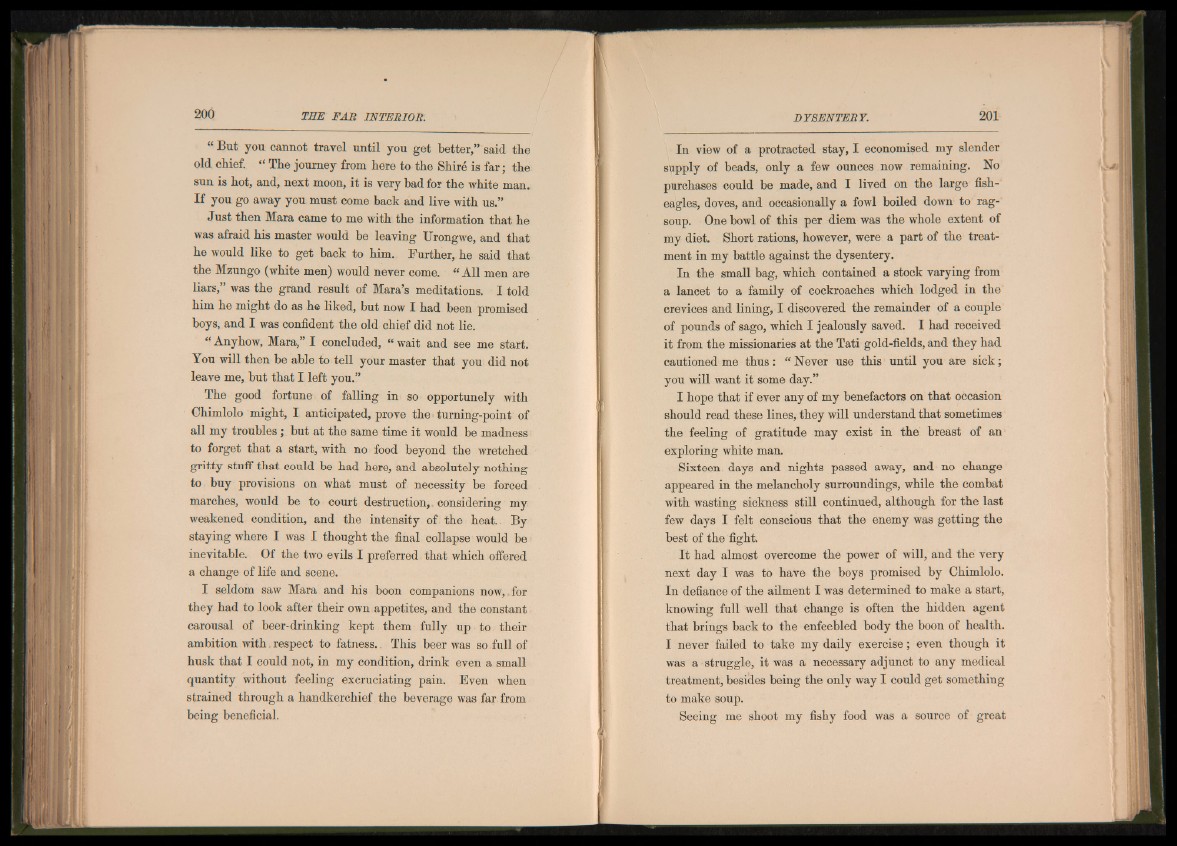
“ But you cannot travel until you get better,” said the
old chief. “ The journey from here to the Shire is fa r; the
sun is hot, and, next moon, it is very bad for the white man.
I f you go away you must come back and live with us.”
Just then Mara came to me with the information that he
was afraid his master would be leaving Urongwe, and that
he would like to get back to him. Further, he said that
the Mzungo (white men) would never come. “ All men are
liars,” was the grand result of Mara’s meditations. I told
him he might do as he liked, but now I had been promised
boys, and I was confident the old chief did not lie.
<f Anyhow, Mara,” I concluded, «. wait and see me start.
You will then be able to tell your master that you did not
leave me, but that I left you.”
The good fortune of falling in so opportunely with
Chimlolo might, I anticipated, prove the»turning-point of
all my troubles; but at the same time it would be madness
to forget that a start, with no food beyond the wretched
gritty stuff that could be had here, and absolutely nothing
to buy provisions on what must of necessity be forced
marches, would be to court destruction,, considering my
weakened condition, and the intensity of the heat.. By
staying where I was I thought the final collapse would be
inevitable. Of the two evils I preferred that which offered
a change of life and scene.
I seldom saw Mara and his boon companions now,.for
they had to look after their own appetites, and the constant
carousal of beer-drinking kept them fully up to their
ambition with. respect to fatness.. This beer was so full of
husk that I could not, in my condition, drink even a small
quantity without feeling excruciating pain. Even when
strained through a handkerchief the beverage was far from
being beneficial.
In view of a protracted stay, I economised my slender
supply of beads, only a few ounces now remaining. No
purchases could be made, and I lived on the large fish-
eagles, doves, and occasionally a fowl boiled down to rag-
soup. One bowl of this per diem was the whole extent of
my diet. Short rations, however, were a part of the treatment
in my battle against the dysentery.
In the small bag, which contained a stock varying from
a lancet to a family of cockroaches which lodged in the
crevices and lining, I discovered the remainder of a couple
of pounds of sago, which I jealously saved. I had received
it from the missionaries at the Tati gold-fields, and they had
cautioned me th u s : “ Never use this until you are sick;
you will want it some day.”
I hope that if ever any of my benefactors on that occasion
should read these lines, they will understand that sometimes
the feeling of gratitude may exist in the breast of an
exploring white man.
Sixteen days and nights passed away, and no change
appeared in the melancholy surroundings, while the combat
with wasting sickness still continued, although for the last
few days I felt conscious that the enemy was getting the
best of the fight.
I t had almost overcome the power of will, and the very
next day I was to have the boys promised by Chimlolo.
In defiance of the ailment I was determined to make a start,
knowing full well that change is often the hidden agent
that brings back to the enfeebled body the boon of health.
I never failed to take my daily exercise; even though it
was a struggle, it was a necessary adjunct to any medical
treatment, besides being the only way I could get something
to make soup.
Seeing me shoot my fishy food was a source of great